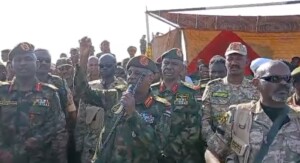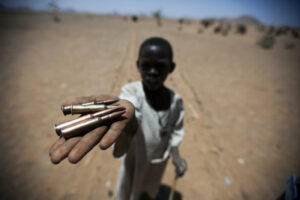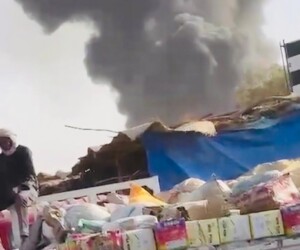Spontaneous Marches of the Millions heavily suppressed in Sudan
The authorities used heavy violence and tear gas at yesterday’s February 24 Marches of the Millions, in which people headed to the Republican Palace in Khartoum. Marches in Khartoum North (Bahri) and Omdurman were also subjected to excessive violence from security forces.
 No Way Back poster by activists in Sudan (social media)
No Way Back poster by activists in Sudan (social media)
The authorities used heavy violence and tear gas at yesterday’s February 24 Marches of the Millions, in which people headed to the Republican Palace in Khartoum. Marches in Khartoum North (Bahri) and Omdurman were also subjected to excessive violence from security forces.
The surprise Marches of the Millions, announced only a day before, took place in Khartoum and other state cities to demand an end to the military coup and full civilian rule. Protesters have been met with excessive violence and arbitraty detentions since demonstrations started after the October 25 military coup.
Marches in Khartoum and Khartoum North
Activist Nazim Serraj explained that a number of protesters were injured as security forces fired tear gas cannisters at the demonstration passing through El Gasr Street near the Republical Palace in Khartoum and Khartoum North. Two activists were injured in the eye and one in the abdomen.
Witnesses reported the violent arrest and detention of several protesters in Khartoum, in which they were severely beaten, and indicated that others sustained injuries as a result of the targeted firing of tear gas cannisters and rubber bullets.
Demonstrators explained that there was a heavy deployment of the army in the vicinity of the Republican Palace. They also explained that more than 20 Thatcher vehicles, loaded with weapons, were employed by police forces next to military armoured vehicles.
Thatcher cars are large Toyota Land Cruiser pickup trucks, historically used by the infamous National Intelligence and Security Services (NISS) and the Rapid Support Forces (RSF).
A demonstration started in Bashar in El Deyoum El Shargia south of Khartoum city and managed to pass the Sharwani bus station to enter El Gasr street, despite being subjected to heavy repression and excessive violence from security forces.
Another demonstration moved to El Sitteen Street, where a stage was set-up on which speeches were held to call for the overthrow of the military coup regime.
A spokesman for the Resistance Committees in Khartoum said that the revolution is still alive and ongoing, despite the fact that four months have passed since the military coup took place on October 25.
The spokesperson highlighted the continuation of demonstrations and sit-ins all over the country to show that the Sudanese have not given up their fight.

during yesterday's Marches of the Millions (social media)
Political charter
The resistance committees in Khartoum confirmed that they are in the process of publishing their political charter, which contains proposals on basic issues regarding justice, equality, and citizenship.
The official spokesman of the Khartoum Resistance Committees, Fadhil Omar, told Radio Dabanga that the movement of the resistance committees expresses the people’s demands.
He explained that the charter called for addressing political fragmentation and converging around a single programme that expresses the desires of the Sudanese people.
The committees thanked the media and citizens abroad for their support for the demonstrations and the rejection of the coup regime and called on the people to rally around these issues. Omar added that only ‘half a revolution’ means a death to the revolution.
Last month, the Resistance Committees in Wad Madani already published a political charter with their demands for a democratic Sudan, which prioritised social justice.
Marches in Omdurman
In Omdurman, Abdelazim Street witnessed massive demonstration heavy repression and excessive violence by security forces.
The Karari Resistance Committees also organised a one-day sit-in in the El Iskan Neighbourhood.
Sajda El Mubarak, a spokeswoman for the Coordination of the Resistance Committees, said in a speech on the sit-in’s stage that the December revolution still continues and is working towards a civilian-led state with democracy, freedom, and justice.
She called on demonstrators to address political fragmentation and rally around one unified programme.











 and then
and then